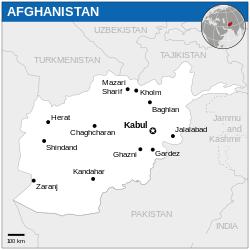မိူင်းဢႃႇၾၵၢၼ်ႇၼီႇသတၢၼ်ႇ
(လုၵ်ႉတီး ဢႃႇၾၵၢၼ်ႇၼီႇသတၢၼ်ႇ ၼႆႈသေ ၶိုၼ်းပိၼ်ႇဝၢႆႇမႃး)
| မိူင်းၸဝ်ႈၾႃႉ ဢိတ်ႉသလမ်း ဢႃႇၾၵၢၼ်ႇၼီႇသတၢၼ်ႇ | |||||
|---|---|---|---|---|---|
| |||||
| ဝဵင်းငဝ်ႈၸိုင်ႈ | Kabul 34°31′N 69°11′E / 34.517°N 69.183°Eၵူဝ်ႇဢေႃးတိၼဵတ်ႉ: 34°31′N 69°11′E / 34.517°N 69.183°E[3] | ||||
| ဝဵင်းယႂ်ႇသေပိူၼ်ႈ | Kabul | ||||
| ၽႃႇသႃႇၵႂၢမ်း ၸႂ်ႉၼႂ်းလုမ်း | |||||
| ၸၢဝ်းၶိူဝ်း (2019 unofficial estimates) | |||||
| လွင်ႈၵိူဝ်းယမ် | |||||
| Demonym | Afghan[မၢႆတွင်း 1][6][7] | ||||
| လူင်ပွင်ၸိုင်ႈ | Unitary totalitarian[8] provisional theocratic Islamic emirate[9] | ||||
| Hibatullah Akhundzada | |||||
| Hasan Akhund (acting) | |||||
| Abdul Hakim Haqqani | |||||
| လုမ်းတႅၼ်းၽွင်းသၢင်ႈမိူင်း | None[မၢႆတွင်း 2] | ||||
| Formation | |||||
| 1709 | |||||
| 1747 | |||||
• Emirate | 1823 | ||||
| 27 May 1863 | |||||
| 19 August 1919 | |||||
• Kingdom | 9 June 1926 | ||||
• Republic | 17 July 1973 | ||||
| 27–28 April 1978 | |||||
| 28 April 1992 | |||||
| 27 September 1996 | |||||
| 26 January 2004 | |||||
| 15 August 2021 | |||||
| ပိုၼ်ႉတီႈ ဢၼ်ပိူင်ႇ | |||||
• ႁူမ်ႈ | (ၸၼ်ႉ: 40th) | ||||
• ၼမ်ႉ (%) | negligible | ||||
| ႁူဝ်ၼပ်ႉၵူၼ်း | |||||
• 2023 လၢမ်း | |||||
| GDP (PPP) | လၢမ်း 2020 | ||||
• ႁူမ်ႈ | $81.007 billion[16] | ||||
• Per capita | $2,459 [16] (ၸၼ်ႉ - 179th) | ||||
| GDP (nominal) | လၢမ်း2020 | ||||
• ႁူမ်ႈ | $20.136 billion[16] | ||||
• Per capita | $611[16] (ၸၼ်ႉ - 190th) | ||||
| HDI (2022) | 0.462[17][18] တႅမ်ႇ · 182nd | ||||
| ငိုၼ်းတွင်း | Afghani (افغانى) (AFN) | ||||
| ၶၢဝ်းယၢမ်းၼႃႈလိၼ် | Afghanistan Time (UTC+4:30 Lunar Calendar[19]) | ||||
| DST is not observed[20] | |||||
| ပိူင်သၢႆလူတ်ႉ | right | ||||
| Internet TLD | .af | ||||
ၶေႃႈမၢႆတွင်း
မႄးထတ်း- ↑ Other demonyms that have been used are Afghani,[4] Afghanese and Afghanistani (see Afghans for further details)[5]
- ↑ Afghanistan is a pure autocracy, with all law ultimately originating from the supreme leader. Consensus rule was initially used among the Taliban, but was phased out as the supreme leader monopolized control in the months following the 2021 return to power.[10][11][12] There is an advisory Leadership Council, however its role is in question as the supreme leader has not convened it for many months (as of မၢၶျ်ႉ 2023),[update] and increasingly rules by decree.[13]
ၽိုၼ်ဢိင်
မႄးထတ်း- ↑ Document 77746.
- ↑ Tharoor၊ Ishaan။ "The Taliban's Qatar Office: Are Prospects for Peace Already Doomed?"၊ 19 June 2013။
- ↑ [[[:ထႅမ်းပလဵတ်ႉ:Geonameslink]] Islamic Republic of Afghanistan] in [[[:ထႅမ်းပလဵတ်ႉ:Geonamesabout]] Geonames.org (CC BY)]
- ↑ Dictionary.com. The American Heritage Dictionary of the English Language, Fourth Edition. Houghton Mifflin Company, 2004. Reference.com Archived 3 March 2016 at the Wayback Machine. (Retrieved 13 November 2007).
- ↑ Dictionary.com. WordNet 3.0. Princeton University. Reference.com (Retrieved 13 November 2007). Archived 28 March 2014 at the Wayback Machine.
- ↑ Constitution of Afghanistan (2004).
- ↑ Afghan | meaning in the Cambridge English Dictionary. the Cambridge English Dictionary. ISBN 9781107660151.
- ↑
- "The Taliban Takeover in Afghanistan and Security Paradox" (December 2022). Journal of Asian Security and International Affairs 9 (3): 383–401. doi:. ISSN 2347-7970. “Afghanistan is now controlled by a militant group that operates out of a totalitarian ideology.”
- Dysfunctional centralization and growing fragility under Taliban rule (6 September 2022). “In other words, the centralized political and governance institutions of the former republic were unaccountable enough that they now comfortably accommodate the totalitarian objectives of the Taliban without giving the people any chance to resist peacefully.”
- Afghanistan's Public Intellectuals Fail to Denounce the Taliban (23 March 2022). “The Taliban government currently installed in Afghanistan is not simply another dictatorship. By all standards, it is a totalitarian regime.”
- Dismantlement of the Taliban regime is the only way forward for Afghanistan (8 September 2022). “As with any other ideological movement, the Taliban's Islamic government is transformative and totalitarian in nature.”
- Akbari, Farkhondeh (7 March 2022). The Risks Facing Hazaras in Taliban-ruled Afghanistan. “In the Taliban's totalitarian Islamic Emirate of Afghanistan, there is no meaningful political inclusivity or representation for Hazaras at any level.”
- ↑
- Choi၊ Joseph။ "EU: Provisional Taliban government does not fulfill promises"၊ The Hill၊ 8 September 2021။
- Bezhan၊ Frud။ "Key Figures In The Taliban's New Theocratic Government"၊ Radio Farda၊ Radio Free Europe/Radio Liberty၊ 7 September 2021။
- George၊ Susannah။ "Inside the Taliban campaign to forge a religious emirate"၊ 18 February 2023။
- ↑ Letter dated 25 May 2022 from the Chair of the Security Council Committee established pursuant to resolution 1988 (2011) addressed to the President of the Security Council. United Nations Security Council (26 May 2022).
- ↑ "Afghanistan dispatch: Taliban leaders issue new orders on law-making process, enforcement of court orders from previous government"၊ JURIST၊ 27 November 2022။
- ↑ "Unseen Taliban Leader Wields Godlike Powers in Afghanistan"၊ Voice of America၊ 28 March 2023။
- ↑ "Senior Afghan Taliban figures move to curb leader" (10 March 2023). Expert Briefings oxan-db (oxan-db). doi:. “[Akhundzada] has not convened the Taliban's Leadership Council (a 'politburo' of top leaders and commanders) for several months. Instead, he relies on the narrower Kandahar Council of Clerics for legal advice.”
- ↑ Central Statistics Office Afghanistan
- ↑ World Bank Open Data.
- ↑ 16.0 16.1 16.2 16.3 Afghanistan. International Monetary Fund.
- ↑ Human Development Report 2023/24. United Nations Development Programme (13 March 2024).
- ↑ (15 December 2020) Human Development Report 2020 The Next Frontier: Human Development and the Anthropocene. United Nations Development Programme, 343–346. ISBN 978-92-1-126442-5.
- ↑ "Taliban Changes Solar Year to Hijri Lunar Calendar"၊ Hasht-e Subh Daily၊ 26 March 2022။
- ↑ Half Hour and 45-Minute Time Zones.

![Coat of Arms of the Islamic Emirate[1]](http://upload.wikimedia.org/wikipedia/commons/thumb/d/d8/Arms_of_the_Islamic_Emirate_of_Afghanistan.svg/85px-Arms_of_the_Islamic_Emirate_of_Afghanistan.svg.png)

